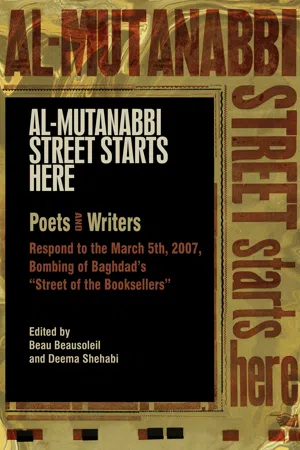
Al-Mutanabbi Street Starts Here
Poets and Writers Respond to the March 5th, 2007, Bombing of Baghdad's "Street of the Booksellers"
- 320 pages
- English
- ePUB (mobile friendly)
- Available on iOS & Android
Al-Mutanabbi Street Starts Here
Poets and Writers Respond to the March 5th, 2007, Bombing of Baghdad's "Street of the Booksellers"
About This Book
On March 5th, 2007, a car bomb was exploded on al-Mutanabbi Street in Baghdad. More than thirty people were killed and more than one hundred were wounded. This locale is the historic center of Baghdad bookselling, a winding street filled with bookstores and outdoor book stalls. Named after the famed 10th century classical Arab poet al-Mutanabbi, it has been the heart and soul of the Baghdad literary and intellectual community. This anthology begins with a historical introduction to al-Mutanabbi Street and includes the writing of Iraqis as well as a wide swath of international poets and writers who were outraged by this attack.
This book seeks to show where al-Mutanabbi Street starts in all of us: personally, in our communities, and in our nations. It seeks to show the commonality between this small street in Baghdad and our own cultural centers, and why this attack was an attack on us all. This anthology sees al-Mutanabbi Street as a place for the free exchange of ideas; a place that has long offered its sanctuary to the complete spectrum of Iraqi voices. This is where the roots of democracy (in the best sense of that word) took hold many hundreds of years ago. This anthology looks toward al-Mutanabbi Street as an affirmation of all that we hope for in a more just society.
Contributors include: Beau Beausoleil, Musa al-Musawi, Anthony Shadid, Mousa al-Naseri, Naomi Shihab Nye, Deena Metzger, Sam Hamod, Lutfiya Al-Dulaimi, Zaid Shlah, Persis Karim, Ayub Nuri, Marian Haddad, Sarah Browning, Eileen Grace O'Malley Callahan, Roger Sederat, Elline Lipkin, Esther Kamkar, Robert Perry, Gloria Collins, Brian Turner, Gloria Frym, Owen Hill, Abd al-Rahim, Salih al-Rahim, Yassin "The Narcicyst" Alsalman, Jose Luis Gutierrez, Sargon Boulus, Peter Money, Sinan Antoon, Muhammad al-Hamrani, Livia Soto, Janet Sternburg, Sam Hamill, Salah Al-Hamdani, Gail Sher, Dunya Mikhail, Irada Al Jabbouri, Dilara Cirit, Niamh MacFionnlaoich, Erica Goss, Daisy Zamora, George Evans, Steve Dickison, Maysoon Pachachi, Summer Brenner, Jen Hofer, Rijin Sahakian, Badr Shakir al-Sayyab, Jane Hirshfield, Jack Marshall, Susan Moon, Diana di Prima, Evelyn So, Nahrain Al-Mousawi, Ko Un, Joe Lamb, Katrina Rodabaugh, Mohammed Hayawi, Nazik Al-Malaika, Raya Asee, Gazar Hantoosh, Mark Abley, Majid Naficy, Lewis Buzbee, Ibn al-Utri, Thomas Christensen, Amy Gerstler, Genny Lim, Saadi Youssef, Judith Lyn Suttton, Josh Kun, Dana Teen Lomax, Etel Adnan, Bushra Al-Bustani, Marilyn Hacker, Richard Harrison, Fady Joudah, Philip Metres, Hayan Charara, Annie Finch, Kazim Ali, Deema K. Shehabi, Kenneth Wong, Elmaz Abinader, Habib Tengour, Khaled Mattawa, Rachida Madani, Amina Said, Alise Alousi, Sita Carboni, Fran Bourassa, Jabez W. Churchill, Daniela Elza, Linda Norton, Fred Norman, Bonnie Nish, Janet Rodney, Adrienne Rich, Cornelius Eady, Julie Bruck, Kwame Dawes, Ralph Angel, B.H. Fairchild, Terese Svoboda, Mahmoud Darwish, Amir el-Chidiac, Aram Saroyan, Sholeh Wolpe, Nathalie Handal, Azar Nafisi, Dima Hilal, Tony Kranz, Jordan Elgrably, devorah major, Suzy Malcolm, Ibrahim Nasrallah, Rick London, Sarah Menefee, Roberto Harrison, Fadhil Al-Azzawi, Amaranth Borsuk, Lamees Al-Ethari, Shayma' al-Saqr, Meena Alexander, and Jim Natal.
Frequently asked questions
Information
III. GATHERING THE SILENCES
In the Valley of Love
Night in Hamdan
Burning
Luis and Celso on al-Mutanabbi Street
Table of contents
- Cover
- Titlepage
- Copyright
- Contents
- Introduction Beaubeausoleil
- Preface Muhsin Al-Musawi
- I. The River Turned Black with Ink
- II. Knowledge is Light
- III. Gathering the Silences
- Contributors
- Acknowledgments